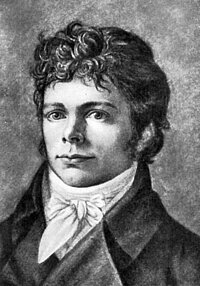Friedrich W. J. von Schelling, Philosoph
* January 21, 1775 in Leonberg
† August 20, 1854 in Bad Ragaz
Schelling studied protestant theology in Tübingen until 1795 and after that mathematics, science and medicine at the University of Leipzig until 1798. During this time he came into far-reaching contact with contemporary giants and leading figures like Hegel, Hölderlin, Schiller and Goethe. The latter helped provide Schelling a professorship at the Jena University in 1798 where he taught philosophy together with his then-mentor Johann Gottlieb Fichte. In 1803, he accepted an offer from the JMU which only lasted three years due to a dispute. After that, Schelling stayed in Munich for 14 years without teaching for the moment. He then taught philosophy to the students of the Erlangen University on a fee basis from 1820-1825, before teaching as tenured professor at the LMU from 1827 to 1840. In 1841, his last stage of working life at the University of Berlin began. In 1846, his public career ended. Schelling’s groundbreaking contributions to the philosophy of religion and nature played a decisive role for the success of the German Idealism (Deutschen Idealismus). Together with Fichte and Hegel he is considered one of the most important philosophes of the 19th century.
His home was Würzburg’s “Alte Universität”.




![[Translate to Englisch:] Nobelpreis Röntgen Ausschnitt](/fileadmin/_processed_/8/4/csm_Nobelpreis_Ausschnitt_cbf91ddcc5.jpg)

